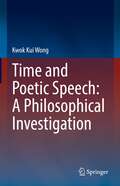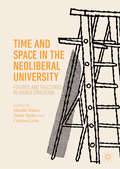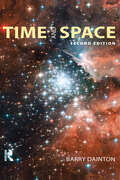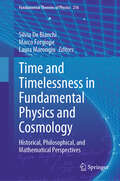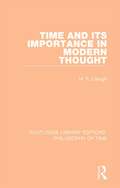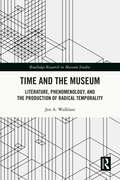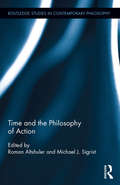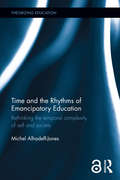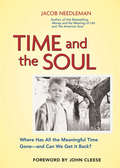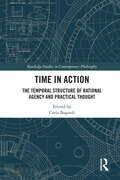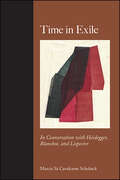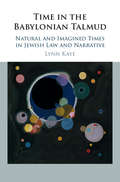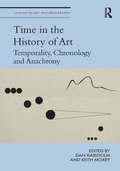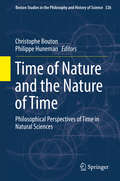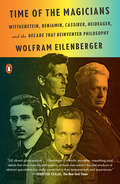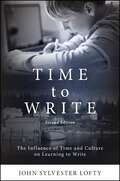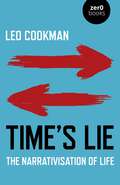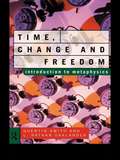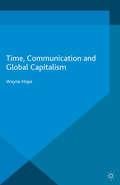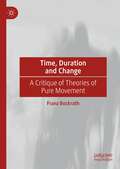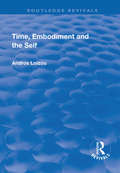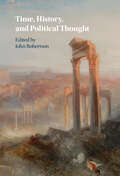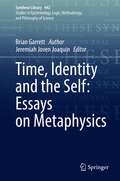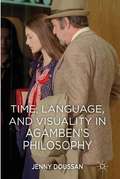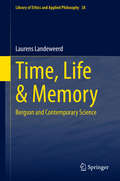- Table View
- List View
Time and Poetic Speech: A Philosophical Investigation
by Kwok Kui WongThis book analyzes the relation between the flow time and poetic speech in drama and rhetoric. It begins with the classical understanding of time as flux, and its problems and paradoxes entailing from Aristotle, Augustine, Kant and Husserl. The reader will see how these problems unfold and find resolutions through dramatic speech and rhetoric which has an essential relation to the flow of time. It covers elements in poetic speech such as affect, rhythm, metaphor, and syntax. It uses examples from classical rhetorical theories by Aristotle, Cicero, Quintilian, dramatic speeches from Shakespeare, as well as other modern dramatic texts by Chekhov, Beckett, Jelinek and Sarah Kane. This book appeals to students and academic researchers working in the philosophical fields of aesthetics and phenomenology as well those working in theater and the performing arts.
Time and Space in the Neoliberal University: Futures and fractures in higher education
by Cristina Costa Yvette Taylor Maddie BreezeThis book offers new interdisciplinary analyses of borders and blockages in higher education and how they can be inhabited and reworked. Amidst stratified inequalities of race, gender, class and sexuality, across time and space, contributors explore what alternative academic futures can be claimed. While higher education institutions are increasingly concerned with ‘internationalization’, ‘diversity’, and ‘widening access and participation’, the sector remains complicit in reproducing entrenched inequalities of access and outcomes among both students and staff: boundaries of who does and does not belong are continually drawn, enacted, contested and redrawn. In the contemporary neoliberal, entrepreneurial and ‘post’-colonial educational context, contributors critically examine educational futures as these become more uncertain. This wide-ranging collection serves as a call to action for those concerned with the future of higher education, and how alternative futures can be reimagined.
Time and Space: Second Edition
by Barry DaintonThe first edition (2001) of this title quickly established itself on courses on the philosophy of time and space. This fully revised and expanded new edition sees the addition of chapters on Zeno's paradoxes, speculative contemporary developments in physics, and dynamic time, making the second edition, once again, unrivalled in its breadth of coverage. Surveying both historical debates and the ideas of modern physics, Barry Dainton evaluates the central arguments in a clear and unintimidating way and is careful to keep the conceptual issues throughout comprehensible to students with little scientific or mathematical training. The book makes the philosophy of space and time accessible for anyone trying to come to grips with the complexities of this challenging subject. With over 100 original line illustrations and a full glossary of terms, the book has the requirements of students firmly in sight and will continue to serve as an essential textbook for philosophy of time and space courses.
Time and Timelessness in Fundamental Physics and Cosmology: Historical, Philosophical, and Mathematical Perspectives (Fundamental Theories of Physics #216)
by Silvia De Bianchi Marco Forgione Laura MarongiuThis book offers a clear account of timelessness together with the discussion of temporality in fundamental physics and cosmology. The multi-disciplinary approach to the problem of time and timelessness shows the remarkable difference between pre-relativistic debates and current developments. This book thoroughly discusses notions of timelessness and time emerging in the most recent literature on Quantum Gravity, String Theory and Cosmology. The contributions explore, among many aspects, the historical-philosophical roots of the notions of temporality and atemporality, the role of mathematics in defining time and temporality with respect to both order relations and causality, approaches to quantum gravity and cosmology that make use of quantum fluids and condensate to approximate space–time in general relativity, time and timelessness in black holes and the problem of cosmological time in bouncing cosmologies. The novelty of this volume lies in the interaction among scientists, philosophers, and historians in exploring the nature of time and timelessness and the origin of these concepts. The book represents a valuable toolkit for researchers and graduate students in physics, cosmology, philosophy and the history of those fields.
Time and its Importance in Modern Thought (Routledge Library Editions: Philosophy of Time #1)
by M. F. CleughOriginally published in 1937. This book is a classic work on the philosophy of time, looking at the pshychology, physics and logic of time before investigating the views of Kant, Bergson, Alexander, McTaggart and Dunne. The second half of the book contains more indepth consideration of prediction, the concepts of past and future, and reality.
Time and the Museum: Literature, Phenomenology, and the Production of Radical Temporality (Routledge Research in Museum Studies)
by Jen A. WalklateTime and the Museum: Literature, Phenomenology, and the Production of Radical Temporality, is the first explicit in-depth study of the nature of museum temporality. It argues as its departure point that the way in which museums have hitherto been understood as temporal in the scholarship - as spaces of death, othering, memory and history - is too simplistic, and has resulted in museum temporality being reduced to a strange heterotopia (Foucault) - something peculiar, and thus black boxed. However, to understand the ways in which museum temporalities and timescapes are produced, and the consequences that these have upon display and visitor response, is crucial, because time is itself a political entity, with ethical consequence. Time and the Museum highlights something we all experience in some way - time - as a key ethical and political feature of the museum space. Utilizing the fields of literature and phenomenology, the book examines how time is experienced and performed in the public areas of three museum spaces within Oxford - the Ashmolean, Pitt Rivers, and Oxford University Museum of Natural History. Using concepts such as shape, structure, form, presence, absence, authenticity and aura, the book argues for a reconsideration of museum time as something with radical potential and political weight. It will appeal to academics and postgraduate students, especially those engaged in the study of museums, culture, literature and design.
Time and the Philosophy of Action (Routledge Studies in Contemporary Philosophy)
by Roman Altshuler Michael J. SigristAlthough scholarship in philosophy of action has grown in recent years, there has been little work explicitly dealing with the role of time in agency, a role with great significance for the study of action. As the articles in this collection demonstrate, virtually every fundamental issue in the philosophy of action involves considerations of time. The four sections of this volume address the metaphysics of action, diachronic practical rationality, the relation between deliberation and action, and the phenomenology of agency, providing an overview of the central developments in each area with an emphasis on the role of temporality. Including contributions by established, rising, and new voices in the field, Time and the Philosophy of Action brings analytic work in philosophy of action together with contributions from continental philosophy and cognitive science to elaborate the central thesis that agency not only develops in time but is shaped by it at every level.
Time and the Rhythms of Emancipatory Education: Rethinking the temporal complexity of self and society (Theorizing Education)
by Michel Alhadeff-JonesTime and the Rhythms of Emancipatory Education argues that by rethinking the way we relate to time, we can fundamentally rethink the way we conceive education. Beyond the contemporary rhetoric of acceleration, speed, urgency or slowness, this book provides an epistemological, historical and theoretical framework that will serve as a comprehensive resource for critical reflection on the relationship between the experience of time and emancipatory education. Drawing upon time and rhythm studies, complexity theories and educational research, Alhadeff-Jones reflects upon the temporal and rhythmic dimensions of education in order to (re)theorize and address current societal and educational challenges. The book is divided into three parts. The first begins by discussing the specificities inherent to the study of time in educational sciences. The second contextualizes the evolution of temporal constraints that determine the ways education is institutionalized, organized, and experienced. The third and final part questions the meanings of emancipatory education in a context of temporal alienation. This is the first book to provide a broad overview of European and North-American theories that inform both the ideas of time and rhythm in educational sciences, from school instruction, curriculum design and arts education, to vocational training, lifelong learning and educational policies. It will be of key interest to academics, researchers and postgraduate students in the fields of philosophy of education, sociology of education, history of education, psychology, curriculum and learning theory, and adult education.
Time and the Soul: Where Has All the Meaningful Time Gone--And Can We Get It Back?
by Jacob NeedlemanIn Time and the Soul Jacob Needleman uses stories-of a middle-aged psychiatrist going back in time to encounter his younger self; of a mysterious meeting in the Central Asian desert; of the mystic master Hermes Trimegistus; as well as stories from the Bhagavad-Gita, the Bible, and other wisdom traditions-to illuminate the great mystery of time and to help us resolve our increasingly dysfunctional relationship to it. Nearly everyone feels stress and anxiety over what's become known as time poverty. "Time management" techniques treat these symptoms by making our busyness more efficient, but not the underlying cause. Needleman shows that we can get more out of time by breaking free of our illusions about it. He helps us experience time more purposefully and meaningfully. He provides parables, reflections, and a unique mental exercise to give us a new understanding of time. By transforming the way we understand and experience time, this powerful book gives us the equanimity and perspective we need to make the most of the time we are given. "A tranquil heart," Needleman writes,"is never defeated by time."
Time in Action: The Temporal Structure of Rational Agency and Practical Thought (Routledge Studies in Contemporary Philosophy)
by Carla BagnoliThis book explores the role of time in rational agency and practical reasoning. Agents are finite and often operate under severe time constraints. Action takes time and unfolds in time. While time is an ineliminable constituent of our experience of agency, it is both a theoretical and a practical problem to explain whether and how time shapes rational agency and practical thought. The essays in this book are divided into three parts. Part I is devoted to the temporal structure of action and agency, from metaphysical and metaethical perspectives. Part II features essays about the temporal structure of rational deliberation, from the perspective of action theory and theories of practical reasoning. Part III includes essays about the temporal aspects of failures of rationality. Taken together, the essays in this book shed new light on our understanding of the temporality of agency that coheres with our subjective sense of finitude and explains rational agency both in time and over time. Time in Action will be of interest to advanced students and researchers working on the philosophy of time, metaphysics of action, action theory, practical reasoning, ethical theory, moral psychology, and rational justification.
Time in Exile: In Conversation with Heidegger, Blanchot, and Lispector (SUNY series, Intersections: Philosophy and Critical Theory)
by Marcia Sá Cavalcante SchubackThis book is a philosophical reflection on the experience of time from within exile. Its focus on temporality is unique, as most literature on exile focuses on the experience of space, as exile involves dislocation, and moods of nostalgia and utopia. Marcia Sá Cavalcante Schuback proposes that in exile, time is experienced neither as longing back to the lost past nor as wanting a future to come but rather as a present without anchors or supports. She articulates this present as a "gerundive" mode, in which the one who is in exile discovers herself simply being, exposed to the uncanny experience of having lost the past and not having a future. To explore this, she establishes a conversation among three authors whose work has exemplified this sense of gerundive time: the German philosopher Martin Heidegger, the French writer and essayist Maurice Blanchot, and the Brazilian writer Clarice Lispector. The book does not aim to discuss how these authors understand the relation between time and exile, but presents a conversation with them in relation to this question that reflects new aspects in their work. Attempting to think and express this difficult sense of time from within exile, Time in Exile engages with the relation between thought and language, and between philosophy and literature. Departing from concrete existential questions, Sá Cavalcante Schuback reveals new philosophical and theoretical modes to understand what it means to be present in times of exile.
Time in the Babylonian Talmud: Natural and Imagined Times in Jewish Law and Narrative
by Lynn KayeIn this book, Lynn Kaye examines how rabbis of late antiquity thought about time through their legal reasoning and storytelling, and what these insights mean for thinking about time today. <P><P>Providing close readings of legal and narrative texts in the Babylonian Talmud, she compares temporal ideas with related concepts in ancient and modern philosophical texts and in religious traditions from late antique Mesopotamia. Kaye demonstrates that temporal flexibility in the Babylonian Talmud is a means of exploring and resolving legal uncertainties, as well as a tool to tell stories that convey ideas effectively and dramatically. Her book, the first on time in the Talmud, makes accessible complex legal texts and philosophical ideas. It also connects the literature of late antique Judaism with broader theological and philosophical debates about time. Introduces a new method for studying concepts in Talmudic texts, helping others conduct conceptual research in rabbinic and other late antique legal literatures; Connects literature of late antique Judaism with broader theoretical, theological and philosophical debates about time, appealing to readers who are interested in time but are not rabbinic literature specialists; Clarifies complex Hebrew and Aramaic source material, making texts that are understood by relatively few experts more accessible.
Time in the History of Art: Temporality, Chronology and Anachrony (Studies in Art Historiography)
by Keith Moxey Dan KarlholmAddressed to students of the image—both art historians and students of visual studies—this book investigates the history and nature of time in a variety of different environments and media as well as the temporal potential of objects. Essays will analyze such topics as the disparities of power that privilege certain forms of temporality above others, the nature of temporal duration in different cultures, the time of materials, the creation of pictorial narrative, and the recognition of anachrony as a form of historical interpretation.
Time of Nature and the Nature of Time
by Philippe Huneman Christophe BoutonThis volume addresses the question of time from the perspective of the time of nature. Its aim is to provide some insights about the nature of time on the basis of the different uses of the concept of time in natural sciences. Presenting a dialogue between philosophy and science, it features a collection of papers that investigate the representation, modeling and understanding of time as they appear in physics, biology, geology and paleontology. It asks questions such as: whether or not the notions of time in the various sciences are reducible to the same physical time, what status should be given to timescale differences, or what are the specific epistemic issues raised by past facts in natural sciences. The book first explores the experience of time and its relation to time in nature in a set of chapters that bring together what human experience and physics enable metaphysicians, logicians and scientists to say about time. Next, it studies time in physics, including some puzzling paradoxes about time raised by the theory of relativity and quantum mechanics. The volume then goes on to examine the distinctive problems and conceptions of time in the life sciences. It explores the concept of deep time in paleontology and geology, time in the epistemology of evolutionary biology, and time in developmental biology. Each scientific discipline features a specific approach to time and uses distinctive methodologies for implementing time in its models. This volume seeks to define a common language to conceive of the distinct ways different scientific disciplines view time. In the process, it offers a new approach to the issue of time that will appeal to a wide range of readers: philosophers and historians of science, metaphysicians and natural scientists - be they scholars, advanced students or readers from an educated general audience.
Time of the Magicians: Wittgenstein, Benjamin, Cassirer, Heidegger, and the Decade That Reinvented Philosophy
by Wolfram EilenbergerA grand narrative of the intertwining lives of Walter Benjamin, Martin Heidegger, Ludwig Wittgenstein, and Ernst Cassirer, major philosophers whose ideas shaped the twentieth century <P><P>The year is 1919. The horror of the First World War is still fresh for the protagonists of Time of the Magicians, each of whom finds himself at a crucial juncture. Walter Benjamin, having survived the flu during the 1918 pandemic, is trying to flee his overbearing father and floundering in his academic career. Ludwig Wittgenstein, by contrast, has dramatically decided to divest himself of the monumental fortune he stands to inherit as a scion of one of the wealthiest industrial families in Europe, in search of absolute spiritual clarity. <P><P>Meanwhile, Martin Heidegger, having managed to avoid combat in war by serving instead as a meteorologist, is carefully cultivating his career. Finally, Ernst Cassirer is working furiously in academia, applying himself intensely to his writing and the possibility of a career at Hamburg University. The stage is set for a great intellectual drama, which will unfold across the next decade. The lives and ideas of this extraordinary philosophical quartet will converge as they become world historical figures. But with the Second World War looming on the horizon, their fates will be very different. <P><P>Wolfram Eilenberger stylishly traces the paths of these remarkable and turbulent lives, which feature not only philosophy but some of the most important other figures of the century, including John Maynard Keynes, Hannah Arendt, and Bertrand Russell. In doing so, he tells a gripping story about four of history's most ambitious and passionate thinkers, and illuminates with rare clarity and economy their brilliant ideas, which all too often have been regarded as enigmatic or opaque.
Time to Write, Second Edition: The Influence of Time and Culture on Learning to Write
by John Sylvester Lofty"To read John's work is to take on the role of a patient listener … A book, like a piece of music, is scored for time, and I feel Time to Write is scored adagio.… I believe that Time to Write can be read as a critique of [the] time-chopping approach to education—and an argument for presence, for being fully open to experience, for being there … To do good work, we must enter something like 'island time' or what John calls 'existential time'—or what is sometimes called 'flow' when we lose, at least temporarily, a sense of clock time." — from the Foreword by Thomas NewkirkTwenty-five years ago, John Sylvester Lofty studied the influence of cultural time values on students' resistance to writing instruction in an isolated Maine fishing community. For the new edition of Time to Write, Lofty returned to the island to consider how social and educational developments in the intervening years may have affected both local culture and attitudes toward education. Lofty discovered how the island time values that previously informed students' literacy learning have been transformed by outside influences, including technology, social media, and the influx of new residents from urban areas. Building on the ethnographic findings of the original study, the new edition analyzes the current conflict between the digital age time values of constant connections and instant communication, and those of school-based literacy. Lofty examines the new literacies now essential for students in a technologically connected world, both those who aspire to continue the traditional island work of lobster fishing, and for the many who now choose to pursue other careers and attend college on the mainland.
Time's Lie: The Narrativisation of Life
by Leo CookmanWhy are facts and statistics disparaged and dismissed, now more than ever? Why do people trust fake news? If we have 'had enough of experts' who should we listen to? Rather than the possible collapse of modern society, could this be an opportunity to look at not just society but our own lives in a different way? Whoever controls the narrative is the one who is in control. Time&’s Lie analyses the history, the science and the philosophy behind the creation of linear stories, or &‘Narrativisation&’ as this book dubs it.
Time, Change and Freedom: An Introduction to Metaphysics
by Quentin Smith L. Nathan OaklanderFirst published in 1995. Routledge is an imprint of Taylor & Francis, an informa company.
Time, Communication and Global Capitalism (International Political Economy Series)
by Wayne HopeIn this book Wayne Hope analyzes the double relation between time and global capitalism. In order to do this, he cross-relates four epistemes of time - epochality, time reckoning, temporality and coevalness – with four materializations of time – hegemony, conflict, crisis and rupture. Using this framework allows Hope to argue that global capitalism is epochally distinctive, riven by time conflicts, prone to recurring crises, and vulnerable to collective opposition. These critical insights are not easily thematized in a mediated world of real-time reflexivity, detemporalized presentism, and denials of coevalness associated with structural exclusions of the poor. However, the worldwide repercussions of the 2008 financial collapse and the resulting confluence of occupation movements, riots, protests, strike activity, and anti-austerity activism raises the prospect of a rupture within and beyond global capitalism.
Time, Duration and Change: A Critique of Theories of Pure Movement
by Franz BockrathThis book studies various perspectives in the history of European philosophy on the relationship between time and movement. Ever since the pre-Socratic thinker Zeno of Elea linked time and space to understand bodily movement, his so-called paradoxes of motion have remained unsolved. One of his most important critics, the French philosopher Henri Bergson, criticized the usual connection between time and space and established a new way of understanding time as duration (durée). Whereas Zeno presented an objectivist understanding of time, Bergson emphasized its subjectivist meaning. Both contradictory positions seem incompatible, referring to pure intellect (Zeno) on the one hand or pure sensation (Bergson) on the other. Looking at Hegel's Phenomenology, this book shows that the outer and inner consciousness of time became crucial to his principle of movement and change. In his view, time is an integral part of dialectical processes that are historically substantiated. Hegel sought to subordinate pure concepts and ideas so that they would become indispensable moments of the self knowing spirit. Cassirer appreciated the idealism of coming into being but rejected Hegel's concept of the absolute. Instead, he established his philosophy of symbolic forms, in which the development of different perceptions and conceptions of time - from situational affective experience to the mathematical system of relations - determines the direction of the symbolic formation process. In the end, the sensitive concept of time is replaced by the relational concept of natural numbers, in which all here-and-now experiences are embedded. Finally, Bourdieu attempts to reintegrate symbolic forms into social processes. The book reflects on the concepts mentioned here by discussing their pros and cons in order to shed more light on the relationship between time and movement in European thought.
Time, Embodiment and the Self (Routledge Revivals)
by Andros LoizouThis title was first published in 2000: Beginning with a sustained argument against the new tenseless theory of time and against McTaggart's A series/B series distinction, the author of this essay goes on to provide a non-paradoxical, tensed, phenomenologically-based account of the 'going on' or 'taking place' of events in time that escapes the paradoxes endemic to 'passage' as understood via the A series/B series distinction. The author then turns his attention to the other main aim of the essay, which is to seek an understanding of time adequate to those more 'embodied' conceptions of the self that place character, and with it the 'constitutive attachments' or 'ground projects' of individual life circumstance, at the centre of the self. This involves a 'redrawing' of the self informed by a wider conception of the will than the one we have inherited via Descartes and Kant, by an account of ground projects, and by the theory of the tripartite psyche in Plato's Republic. It also involves extending the account of time developed in the second chapter in a way that draws on the notion of 'ecstatic temporality' that originates with Heidegger. The essay will be of use to philosophers and advanced students interested in the nature of the self, time, temporality, and phenomenology.
Time, History, and Political Thought
by John RobertsonBetween the cliché that 'a week is a long time in politics' and the aspiration of many political philosophers to give their ideas universal, timeless validity lies a gulf which the history of political thought is uniquely qualified to bridge. For that history shows that no conception of politics has dispensed altogether with time, and many have explicitly sought legitimacy in association with forms of history. Ranging from Justinian's law codes to rival Protestant and Catholic visions of political community after the Fall, from Hobbes and Spinoza to the Scottish Enlightenment, and from Kant and Savigny to the legacy of German Historicism and the Algerian Revolution, this volume explores multiple ways in which different conceptions of time and history have been used to understand politics since late antiquity. Bringing together leading contemporary historians of political thought, Time, History, and Political Thought demonstrates just how much both time and history have enriched the political imagination.
Time, Identity and the Self: Essays on Metaphysics (Synthese Library #442)
by Brian GarrettThis volume contains twenty-four essays by the British/Australian analytic metaphysician, Brian Garrett. These essays are followed by four short dialogues that emphasize and summarize some of the main points of the essays and discuss new perspectives that have emerged since their original publication.The volume covers topics on the metaphysics of time, the nature of identity, and the nature and importance of persons and human beings. The chapters constitute the fruits of almost four decades of philosophical research, from Brian’s two award-winning essays, published in Analysis in 1983 and The Philosophical Quarterly in 1992, to his latest ideas about Fatalism and the Grandfather Paradox.This book will be of interest to students and professional philosophers in the field of analytic philosophy.
Time, Language, and Visuality in Agamben’s Philosophy
by Jenny DoussanGiorgio Agamben, a philosopher both celebrated and reviled, is among the prominent voices in contemporary Italian thought today. His work, which touches upon fields as diverse as aesthetics and biopolitics, is often understood within a framework of Aristotelian potentiality. With this incisive critique, Doussan identifies a different tendency in the philosopher's work, an engagement with the problem of time that is inextricably bound up with language and visuality. Founded in his early writings on metaphysics and continuing to his present occupation with inoperativity, Time, Language and Visuality in Agamben's Philosophy forges an original path through Agamben's extensive commentary on the linguistic and the visual to illuminate the recurrent temporal theme of capture and evasion the cat-and-mouse game that bears the foundational violence of not just representation but concept-formation itself. In the process, Doussan both reveals its limit and establishes a ground for future engagements. "
Time, Life & Memory: Bergson and Contemporary Science (Library of Ethics and Applied Philosophy #38)
by Laurens LandeweerdThis book revitalizes the relevance of the ideas of Henri Bergson (1859-1941) for current developments in exact sciences. It explores the relevance of Bergson's thought for contemporary philosophical reflections on three of the most important scientific research areas of today, namely physics, the life sciences and the neurosciences. It does so on the basis of the three interrelated topics of time, life and memory. Henri Bergson (1859-1941) was one of the most widely read philosophers of his era. The European public was seeking for answers to questions of the soul and the nature of life and fitting within a historical niche between intellectual rationalism and intuitive spiritualism, his writings drew much attention. This work focuses on the relevance of his philosophy for developments in exact sciences today. The discussion of physics in relation to the abstract and the concrete, the life sciences in relation to concepts of life in relation to new and emerging biotechnology, and the neurosciences in relation to the dual nature of human identity, focuses on one main topic: time. Time, isolated from experience, as the measure of the events in the universe in modern physics; time as the measure of emergent systems in evolution as the backdrop of the theory of evolution in biology; time in relation to memory and imagination in neuropsychological accounts of memory. The author thus discusses the ideas of Henri Bergson as a basis to unveil time as a living process, rather than as an instrument for the measure of events. This view forms the basis of a novel approach to the philosophy of technology. An exciting book for academics interested in the interplay between hard sciences and philosophy.
